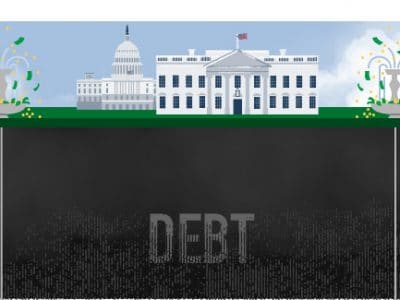New administrations normally inspire commentators into rummaging through a thesaurus to extract that single phrase or word that is apposite to the times. Instead musing about a reincarnation of The Square Deal, The New Deal, The Great Society, or the If-You-Thought-the-Others-Were-Something-Wait-Till-You-See-This Program, let’s look at a writer who really had a taste for the extravagant, Edgar Allan Poe. No one beats this master of the macabre for delving into the remoter regions of the dark side that lurk in every soul. And without question, there’s enough macabre lurking in our nation’s capital today to satiate the weirdest among us.
So many poems, so many stories, so little space to use them all! Let’s settle on The Masque of the Red Death and see where that leads us. The tale begins with Prince Prospero gathering a thousand of his friends “into the deep seclusion of one of his castellated abbeys” to seal them from a pestilence, the “Red Death,” which had claimed half of his countrymen. Within this secure confine these masquerading waltzers revel in the company of buffoons and ballet dancers, while cavorting through chambers where a kaleidoscope of colors sprays ghastly patterns across walls and floors. In one room, a giant ebony clock looms over all, sounding its “brazen lungs” on the hour, causing temporary surcease of frivolities. Into this mix enters a masked figure, “shrouded … in the habiliments of the grave,” with a physiognomy of a corpse dabbled in blood. His presence so enrages the prince that he assaults the stranger, only to drop dead in the encounter, as do all of his companions when they discover to their horror that the disembodied wraith was “untenanted by any tangible form.” At the last stroke of twelve, the ebony clock expires with the “last of the gay.”
What does this all mean? Poet Richard Wilbur explains that this windowless fortress represents a dream world whose inhabitants are free from the harshness of “waking temporal consciousness,” symbolized by the deathly figure draped in funereal garb speckled with blood. The ebony clock represents the inevitable countdown to the ruthless truth of reality, from which Poe spent his entire professional life trying to flee. Injecting the reality principle into the fantasies of the revelers destroys them and the world they inhabit.
So what does this have to do with politics’ Plenty, especially if one no longer can make sense of stories about Washington’s revelers, whose antics defy normal categories of policy description and push to the farthest boundaries of political and economic sanity. A sampling: multi-trillion dollar deficits are projected for programs that somehow magically will save money, all while being opposed by a majority of the American people. Unemployment soars, in a world where fears of man-made global warming challenge Puff-the-Magic-Dragon for the award of the most favored fantasy of the decade. Charges are hurled against citizens who are regarded as cowards or children by those who haven’t the faintest idea of what lies outside the cocoon of Washington rhetoric. Patriots are prosecuted while psychopaths are protected; allies are betrayed, crucial decisions dithered on, adversaries appeased, dictators coddled, dissent dismissed with contempt and threatened by subtle hints of annihilation.
To some of us who once peppered our lawns with “I Like Ike” signs, whose eyes get watery with the sounds of patriotic music, and whose intellectual architecture includes John Phillip Sousa melodies and tales of Orson Wells’ attack of the Martians, it is all madness. It is Prince Prospero’s costumed specters whirling in masqueraded follies, insulated from the world and from the “red death” of reality. Even Poe would be challenged by such a lunatic environment; indeed, he should sue Washington for copyright infringement.
All of which leaves some with the feeling that what we are witnessing in our nation’s capital today simply cannot go on indefinitely; it is not “sustainable,” to use currently fashionable gibberish. A day of reckoning awaits us; or an apocalypse, call it what you will. Time and repetition have attenuated the shock value of facile comparisons to the Great Depression or banana republic economics. Something more profound is at work here, more disturbing. Call it deep anxiety, that creeping terror that hollowed out the souls of Poe’s characters, leaving them empty and quaking at the same time. Can a void tremble? Yes, it can, he taught us and experience confirms. We’re waiting for the reality principle to assert its truth, for that doleful clock to strike its final note.
God help us all when that time arrives for America.




